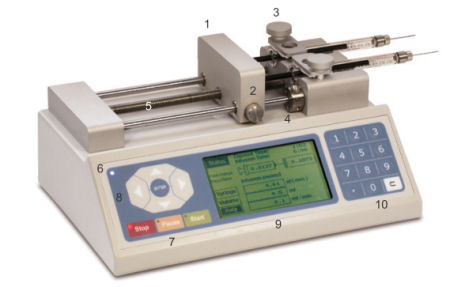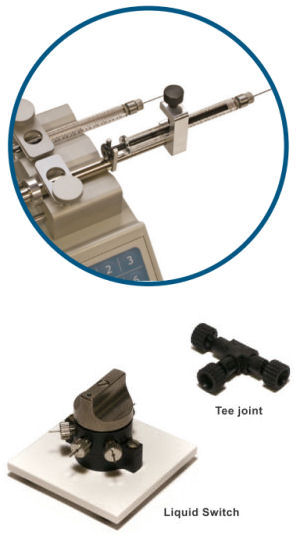Model 100 Syringe pump (2 channels)
Model 100 applies a micro-step motor mechanism permitting the
application at a low flow rate.
The liquid crystal display makes easily the setup of the flow rate
and operation time. It shows
an excellent stability in the flow rate. The flow rate could be
adjusted in range of 0.001 無/min
to 90 mL/min. Because of the wide range of the flow rate, this pump
could be applied in flow
injection analysis, and sensor and microdialysis researches.
The setup configuration is remained internally and it is possible to
repeatedly investigate with
the same conditions.
Features
- Dual syringe pump
- Liquid crystal display
- Excellent operation of user interface
- A variety of syringes in different sizes
- Remote control by computer
- Alarm verification
Model 100 Syringe pump
 |
1.Push block 2.Push block open nut 3. Syringe clamp 4. Safety nut 5. Lead screw 6. Power lamp 7. Stop - Pause - Start key 8. Navigation key 9. Liquid crystal display 10. Value input key |
At the back panel of the pump, there is a 9 pin RS-232 connector.
Specifications
| Syringe size | 0.5 無 - 60 mL |
| Power supply | 100 - 240 VAC, 50/60 Hz |
| Operation mechanism | Steeping motor |
| Resolution | 0.196 痠/step |
| Flow rate range | < 1 無/h (10 無 syringe) - 90 mL/min (60 mL syringe) |
| Size | 240 (W) x 170 (D) x 110 (H) mm |
| Weight | 2.6 kg |
| Operating temperature | -25 - 80 蚓 |
| Operating humidity | 20 - 80% RH |
| Catalog No. | Description |
 |
| 012085 | Model 100 Syringe pump 2 channels | |
| Optional | ||
| 009019 | ALS105 syringe 10 無 | |
| 009026 | ALS105 syringe 250 無 | |
| 009021 | ALS105 syringe 0.5 mL | |
| 009020 | ALS105 syringe 1.0 mL | |
| 009022 | ALS105 syringe 2.5 mL | |
| 009023 | ALS105 syringe 5.0 mL | |
| 009521 | FEP tube, ID: 0.12 mm (1 m) | |
| 009520 | FEP tube, ID: 0.15 mm (3 m) | |
| 009500 | Tube adaptor (10 pcs) | |
| 009500 | Tubing adaptor | |
| 011621 | Liquid Switch | |
| 012771 | Push-Pull adaptor | |
| 000715 | Tee joint | |
Push/Pull adaptor: The suction of the sample could be performed
using the push/pull adaptor. It will reduce the backpressure which
will prevent the leakage at the tube joint and avoid that the air
bubbles enter.